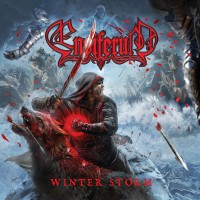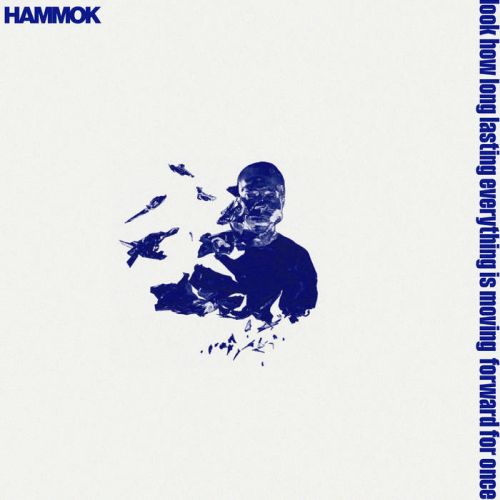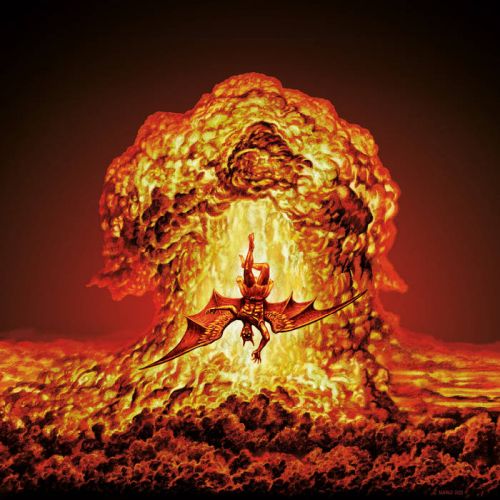Wait A Minute! This Isn't Metal! - March 2024

| Written by: | RaduP, musclassia |
| Published: | April 11, 2024 |
Wait A Minute! This Isn't Metal! - March 2024
Metal Storm's outlet for nonmetal album reviews
The place where we'll talk about music without growls or blast beats
unless they still have those but still aren't metal
unless they still have those but still aren't metal
We here at Metal Storm pride ourselves on our thousands of metal reviews and interviews and article; metal is our collective soul and passion, which is why we bother with this junk. That being said, we'd be lying if we stuck to our trve-kvlt guns and claimed that metal is the only thing we ever listen to. Whether we want to admit it or not, we do check out some other stuff from time to time; some of us are more poptimistic than others, but there's a whole world out there aside from Satan-worshiping black metal and dragon-slaying power metal. We do already feature some nonmetal artists on our website and have a few reviews to back them up, but we prefer to limit that aspect of the site to those artists who have been a strong influence on the metal scene or who are in some way connected to it. This article series is the place for those artists who don't matter to metal in the slightest but still warrant some conversation - after all, good music, is good music, and we all know metal isn't the only thing on this planet for any of us.
Down below, you might find some obscure Bandcamp bedroom projects or some Billboard-topping superstar; as long as it ain't metal and the album itself isn't a best-of compilation, it fits. Obviously, we're certain that not everything will be for everybody (you guys can be viciously territorial even when metal is the only thing on the menu, and we're all supposed to like the same things), but we do hope you find at least one thing that you can enjoy, instead of just pointing and screaming in horror "Not metal!" as if that would be an insult.
Here are our previous features:
February 2024
January 2024
December 2023
And now to the music...
RaduP's pick
Sometimes you know right from the band's name that they're gonna be fire. And then you lay your eyes on that cover art courtesy of Sarah Kolat and it becomes instantly clear that you're in for something disgustingly good before you even press play. I knew I would be made uncomfortable and sick by this album, but somehow the effect was paradoxically both discomfort and comfort. It's hard to explain. It's a weirdly warm album, but it's not a warmth you should seek. It's the bottle that is there when everything in your life is gone. But you cannot leave, you have nowhere else to go. Leave and you might lose your life. You will never be sober.
There's something about Crippling Alcoholism (the band) that works with gothic rock, a genre which literally has a subgenre called "coldwave" and somehow makes it feel warm in a sick way. A lot of it is due to the layers of fuzz from the noise rock that make it feel like a blanket, but no album this ominous and depressing should feel this comforting. Even the coldest synths on this album feel disturbingly warm. You must not seek that warmth. Even if you're the boring one that doesn't drink. Even if you get accused of not being a team player when you have to skip every teambuilding event because somehow they're all centered around alcohol. Even when you're accused of being rude because as a guest you shouldn't refuse the alcoholic gift your host gives you. Even if you have to pretend every time that you're driving a car and that's why you're abstaining. Fuck the 0.
Bandcamp | Apple Music | Spotify
by RaduP
Formed in 2020, Norway’s Hammok come flying out of the blocks on their verbosely titled debut album, Look How Long Lasting Everything Is Moving Forward For Once, which arrives after 2022’s EP Jumping/Dancing/Fighting and a slew of singles. The band’s style on Look How Long... is the kind of sound that isn’t metal, but is on the more extreme side of music that can qualify for these articles. Initially, it seems too heavy even for that, as opening song “Long Lasting” unleashes a brief yet frenetic assault of mathcore in the vein of The Dillinger Escape plan; however, after this song, Hammok dial down the intensity slightly in favour of more dedicated exploration of the likes of noise rock and post-hardcore.
It is really the opening one-two of the album that sets out its stall in terms of variety, as “Long Lasting” is immediately followed by the electronics-heavy noise rock of “Séance”, albeit with a ranting screamed vocal style remaining the approach of choice. Subsequent songs mix up sounds; there are some brief snippets of extremity in “Wannabe (Billboard No. 1)”, despite this song otherwise being one of the accessible here, featuring a boppy punkiness and melodicism not miles away from earlier Rise Against. Another example of the band’s range is “Brainrotdesperation”, which follows up a first half of brooding noise rock with minutes of dreamy synths. Further outbursts of visceral technicality on “Opportunity Erased” and “Trap Door” demonstrate that Hammok could fully commit to mathcore if they wanted to, but the breadth of this album makes it clear that they do not wish to be confined to any one specific style.
Bandcamp | Apple Music | Spotify
by musclassia
With one of the funniest names out there, "Pissed Jeans" might evoke either images of that one time you got so drunk that you lost control of your bladder or that one time in first grade when you had to decide whether asking your teacher to use the bathroom during class was more embarrassing than pissing yourself before your bladder decided for you. Regardless of how the piss landed in the aforementioned jeans, Pissed Jeans are also a band whose music is kinda on the edge of stuff that might even be fitting of a place in our database. Noise rock and post-hardcore are already tangential, and add a hunch of sludge tinge on some albums and you're almost there.
Even if I had stumbled upon the band before, Half Divorced was my first proper encounter with them, and it was only after listening to it that I actually dug into their back catalog and figured they're much older than I gave them credit for. Ok, not much older, but they definitely sound younger than a band that's been at it for slightly more than two decades, and one whose previous album was seven years ago. Half Divorced sounding like a younger band than the band's actual age is only testament to how the loud rowdiness and the satirical comedy on it still feels vital, kinda like a blend of the rowdiest moments of Idles with something noisier like Jesus Lizard and sludgier like Unsane.
Bandcamp | Apple Music | Spotify
by RaduP
In another case of a completely bonkers bad name that instantly attracted my attention, Mannequin Pussy definitely make music that's as irreverent as their band name would imply. Some sort of punk-ness would be quite implied here, but indie rock bands generally take a bit more of a post-punk branch of punk when injecting it into their music, and for a lot of I Got Heaven that is indeed the case, but the moments where the punk is noisier and heavier, bordering on hardcore punk or post-hardcore and noise rock are definitely setting it apart. It still isn't a very heavy record, with a lot of it sitting on something more mellow in sound.
It's a contrast that's pretty cool to hear, even if it's not completely groundbreaking. The band still manages to inject some noise and rowdiness even in the poppier moments, of which there are quite a few, making it sound more like noise pop than indie pop. The punk and the pop side work pretty well together to make every emotion this album expresses more aggressively intense, which also makes sense with such a short runtime at a little under thirty minutes.
Bandcamp | Apple Music | Spotify
by RaduP
A lot of bands find a lane and stick to it. If it ain't broke don't fix it. When Yard Act debuted with The Overload back in 2022, they debuted in a scene whose sound was already pretty well established and quite popular in a not really mainstream and not really underground way. Post-punk of the more recent kind is something I've covered extensively and The Overload stood out for how tongue-in-cheek and scanting the more spoken word-ish leaning vocal performance on it was, but as a whole it was the kinda album that had potential for more because the prototype was a bit too samey all around.
Where's My Utopia? is the result of a band consciously avoiding sounding samey again. While some of it is still indebted to the post-punk sound they started in, a lot more goes into the sound here, while also working more on the strengths they already had. There's a lot more alternative sounds at play, some more punk leaning, some more dance leaning, even some hip-hop touches, but it's all held together by how the vocal performance feels so scathing and ironic and by how the songwriting can be tongue-in-cheek to the point where it goes full circle towards being nearly sincere in either its emotions or its catchiness. Perhaps a bit too all over the places, and perhaps a balance between the approaches of this and the previous would be the winning formula for Yard Act.
Apple Music | Spotify
by RaduP
Offering a blend of genres that encapsulates rock, electronica, industrial and tinges of metal, Switzerland’s Nonexister have brought into existence an intrigue combination of sounds on full-length debut Demons. The opening song of this record (produced by Tommy Vetterli from Coroner and Kreator) does show off the harder side of the band’s sound, as “You Pain Up My Veins” weaves in increasingly dense guitar layers to sustain its rigid industrial march forward. However, the group’s proclivity for satisfying yet subtle melody is demonstrated immediately afterwards on “Drowning In The Void”; a throbbing bassline and slick drum groove serve as the lynchpin for really pleasantly textured guitar motifs, intelligent infusions of electronica, and frontman Nik Leuthold’s powerful and varied vocals.
This latter song is arguably the standout cut on Demons, but further gems can be encountered in the Nine Inch Nails-influenced “How Do You Dare”, the bouncing electronics of “A Promise In The Air”, and moody rocker “Storm”. This is quite a musically varied debut, and not every experiment pays off; in particular, it’s hard to fully understand quite what Nonexister were aiming for with the erratic, ranting vocals and awkward chorus of “Kater”, while the spoken word-only closer “2048” is a tad indulgent. However, it’s easy to forgive occasional misses when the basis of the album is one of creativity and inspiration, such as it is here.
Bandcamp | Apple Music | Spotify
by musclassia
Yeah yeah, I'm kinda chickening out of reviewing this on the main page by writing it up in this feature instead. Sue me. This was in my consideration for a main page review, ended up not doing it, and figured I might as well cover it here instead of not covering it at all. Well, in my defense, it really is not a metal album. The Body's sludge days are far behind them and their industrial music has been heavy as all hell, but it isn't really industrial metal (other genres can be heavy too, ya know). Sure, we're not overly pedantic about how metal something heavy is before covering it or featuring it, but it also doesn't mean that we have to force the "metal" tag.
But sure, there is some metal on Orchards Of A Futile Heaven, a bit of sludge-, a bit of drone-, a bit of industrial-metal, and you can tell at least one of the collaborators here dabbled a lot in the metal world. Dis Fig is the side that has dabbled in heavy music like noise and death industrial and post-industrial and power electronics that doesn't necessarily involve metal, and that's something that works really well with the very similar noises done by The Body, but this time with some slightly more ethereal vocals to merge with the usual The Body-ish shrieks, to the point where it feels just a bit dream pop tinged, but in the noisiest and most corrupted way possible.
Bandcamp | Apple Music | Spotify
by RaduP
Which ones of you had "a 70 year old woman drops the sickest industrial hip-hop album of the year" on your bingo cards? Anyone? It's quite a headscratcher that this album exists the way it does, like sure experimental artists are always gonna experiment with sounds, but you usually find them experimenting with more familiar sounds at this point in their career. Not everyone is a Scott Walker completely shifting gears in their old age. Kim Gordon has been doing a lot of experimental noisy music, whether as part of Sonic Youth, whether in some of the collaborative records she released, whether on her solo debut on 2019's No Home Record, all of which dabbled in shades of experimental rock with alt rock, noise rock, post-industrial, no wave, and whatnot.
So to hear something a bit more left-field in how those hi-hats and 808s clearly borrow from hip-hop aesthetics and how well that works with Gordon's deadpan delivery to create something in line with that same lethargy found in a lot of abstract hip-hop, while the noise palettes that seem more in line with the experimental noise rock that Gordon has been dabbling with her whole career give the hip-hop that industrial edge. Not all of it is rooted in something hip-hop leaning, but the way the grooves and beats work on The Collective makes it feel seamless even when the hip-hop elements fade and when they're at the forefront.
Bandcamp | Apple Music | Spotify
by RaduP
musclassia's pick
Traum is the debut album from the band that shares its name, but Traum is not comprised of musical novices; its members perform in bands such as Fuzz Orchestra, Zu and Lento. These bands span a range of sounds, from the fuzzy metal of Lento to the avant-garde jazz rock of Zu, but the members joined together conjure up something a bit more familiar in Traum, which is most easily categorized as part of the psychedelic rock or space rock genres. While such genres are well-trodden ground, it’s ground that can merit further retreads if done well or with some novelty in approach, and Traum is a very accomplished release.
Opener “Kali Yuga” does an excellent job of setting the vibe for the record, which is somewhere within the ballpark of King Buffalo’s mellow musical approach while only fleetingly exhibiting any signs of that group’s heavier tendencies. Throw some prog/space rock synths in there too, and Traum create some really nice soundscapes, with a lot of infectiously charming melody in this track and others that follow. There’s no vocals on the album, but there are quite a few surprises, as Traum explore adjacent genres with abandon; the band dig into psychedelic rock’s love of raga on “Vimana”, explore ambient soundscapes on the record’s longest track “Katabasis”, and there’s also the appropriately titled “Infraterrestial Dub”, which sounds like a dub/space rock crossover. Zu’s Luca Mai is mostly confined to synths, but he does get to unleash his saxophone skills with a tasteful solo on the sparse, soporific “Erwachen”.
Bandcamp | Apple Music | Spotify
by musclassia
musclassia's pick
For a long time, Iota appeared to be a ‘one and done’ project; 2008’s debut album Tales represented the only recording from the group for well over a decade, whose members went on to form or join bands such as Dwellers and SubRosa. However, it seems this trio felt there was unfinished business, as the existence of Pentasomnia would attest to. The amalgamated title track roughly translates to ‘five dreams’, and this new record is comprised of 5 songs, which were written and recorded in 2018 and 2019 before slowly working their way towards release.
The first of these tracks, “The Intruder”, shows off Iota’s decade-spanning rock style; the track at different times embraces the swagger of 60s blues rock, the shimmer of 70s psychedelic rock, and the drive of 90s desert rock. Subsequent tracks delve further into the glorious history of rock, whether it be the space rock synths and muscular distortion on “The Witness”, the extended soloing across “The Returner”, or the Earthless-esque jam feel of “The Timekeeper”. Pentasomnia is not just a tribute to the wonders of rock, but a really satisfying demonstration of why so many generations have loved this genre.
Bandcamp | Apple Music | Spotify
by musclassia
I feel like most people would agree that an 85-minute debut album is a tad indulgent, even for a prog group, but evidently Full Earth disagree. In fairness, this is not the work of a bunch of novices; Full Earth features the trio behind Kanaan (including current Motorpsycho live drummer Ingvald Vassbø, who is the primary composer in this new band) alongside AVKVRST’s Øystein Heide Aadland on keyboards, plus Simen Wie on bass. This supergroup flex their chops on Cloud Sculptors, which boldly opens with a 21-minute testament to instrumental prog named “Full Earth Pt I: Emanation”, a vibrant affair characterized by protracted builds featuring flashy synth motifs, driving stoner rock riffing (Elder, Sleep and High On Fire are namedropped as influences on the album’s Bandcamp), and across-the-board virtuosity.
This opening song is perhaps the heaviest here, but Full Earth infuse undiluted rock into the entirety of the album, trading off cool, slick riffs with quirky jams, along with occasional moments of tranquillity, such as the dainty synths and flutes bookending the title track. Amongst the 4 gargantuan songs are two more bitesized morsels in the forms of “Weltgeist” and “Echo Tears”, both of which serve as stark departures by serving as almost ambient organ compositions influenced by the likes of James Ferraro and Onehotrix Point Never. It is on those big rock jams that Full Earth really make their impression, however, particularly on “The Collective Unconscious”, an odyssey that begins in muted prog fashion before gradually ratcheting up the volume and intensity for a big, eclectic rock freakout.
Bandcamp | Apple Music | Spotify
by musclassia
Originally the solo project of vocalist/keyboardist Shelby Logan Warne, Kyros has undergone quite a lot of turnover in personnel since turning into a full band; this latest album, Mannequin, represents the recording debut in the band for bassist Charlie Cawood, who is or has been involved in several other prog rock groups prior to now (notably including Knifeworld, led by Gong’s Kavus Torabi). After an understated acoustic intro piece in the form of “Taste The Day”, Cawood gets a chance, along with all the other members, to show off his skills on “Showtime”, a wonderfully upbeat and whimsical display of synth-heavy neo-prog. There’s a slight heaviness to the track that nudges it towards prog-metal such as Dream Theater, but Kyros are a rock band first and foremost, and they’re one that seem to be having a bit more fun than they did on 2020’s Celexa Dreams.
Kyros clearly draw a lot of inspiration from 80s music, as synthpop-influenced cut “Illusions Inside” serves as evidence for, but the band are capable of combining old and new sounds and merging genres, as best demonstrated on album highlight “Esoterica”, a joyful fusion of synthwave pulsations, funky groove, and dancefloor hookiness, all within a prog rock framework. Those keen to hear the band’s proggiest inclinations on full display can revel in the virtuosity demonstrated across “The End In Mind”, while others seeking poppier sensibilities might opt to seek out “Ghosts Of You” or “Liminal Space”. Mannequin is eclectic without being chaotic, and exhibits more than enough in the way of both complexity and accessibility to have broad appeal.
Apple Music | Spotify
by musclassia
As might be expected based on past form, Zombi’s latest effort is a testament to the enduring appeal of 80s synth music, whether in the form of playful bright melody or darker, cooler sounds (both can be heard on the lively opening title track, particularly with the unmistakable “Tom Sawyer” descending synth tones in the latter stages). Despite their presence on this site, Zombi have never really been a metal band, but Direct Inject does see them turn down the relative heaviness compared to previous record 2020, which did feature regular distorted guitar riffs. On Direct Inject, synths reign supreme, and the duo demonstrate their versatility across the album’s runtime.
There’s a slight sadness to the melodies on “So Mote It Be”, but “Bodies In The Flotsam” definitely plays up the coolness, particularly with the rhythm section beneath the synths once again harking back to Motion Pictures-era Rush. “Sessuale II” (curiously positioned before “Sessuale I”) shows off a different side of the 80s, with a gentle sleaze to it (particularly courtesy of the saxophone) that would make it perfect for cruising to Malibu Club in Vice City, but the song’s companion piece veers more towards ambient synth music. In between the pair of songs, one final notable track is “The Post-Atomic Horror”, whose thick distortion represents the closest that Zombi get to the sound of several songs on 2020; however, it ultimately doesn’t leave one pining for said previous style, as the charm of the other music here wins out.
Bandcamp | Apple Music | Spotify
by musclassia
Kontravoid is the alter ego of prolific darkwave producer Cameron Findlay, who has put out a variety of releases across a decade of recording under the stage name. With a sound rooted in darkwave, Kontravoid do explore the boundaries of this genre, ranging from gothic Sisters Of Mercy-style dancefloor boppers through to colder, more industrial fare or livelier techno-influenced material. On Detachment, Kontravoid continues to serve up songs purpose-built for alternative club nights with pounding beats and infectious synths.
Opening song “Awaken” pulsates along, lurking at the threshold between darkwave and synthwave, with the danceability of the former and the hacker vibes of the latter, but is immediately followed by the lighter, trancey “For What It Is”. Most of the songs feature Kontravoid’s baritone vocal style, as is so commonly used in this style, but guest singer Chelsey Crowley from Nuovo Testamento brings a suitably retro vibe to “Losing Game”, a song so nostalgic for 80s synthpop that it could easily have been on Vice City’s Wave 103 channel. Other notable cuts include the rampant industrial synth of “Reckoning”, the blisteringly quick “How It Ends”, and the slower closing title track. The album as a whole, however, is a vibrant throwback to the 80s, and destined to appeal to fans of classic new wave/post-punk, or other leading revivalist acts such as Twin Tribes or Drab Majesty.
Bandcamp | Apple Music | Spotify
by musclassia
Synthwave has long run adjacent to metal, from Perturbator and Carpenter Brut’s background in metal bands and collaboration with metal artists through to acts such as Dance With The Dead and Abstract Void. Gost underline the overlap between the genres even more by finding himself on Metal Blade Rcords, and this latest effort sees him legitimately spilling over from one genre into the other. Early tracks “Prophecy” and “Death In Bloom” feature outbursts of blast beats and metallic distortion that sit alongside synth grooves and ominous bell chimes.
As the album progresses, these metal elements do drift towards the background as Gost’s classic darksynth takes hold on the likes of ominous city slickers “Deceiver” and “Temple Of Tears”, as well as the rampant, throbbing “Golgotha” and the pulsating “Shelter”. Nevertheless, that more abrasive side to Gost’s sound, arguably even more so than on Rites Of Love And Reverence, remains present throughout, between the screams that alternate with deep gothic cleans on “Widow Song”, the guitar distortion in “Through The Water”, and the outright freneticism of “Digital Death”. On this current trajectory, Gost may end up releasing a full-blown metal album in the near future, and based on the cameos of this genre on Prophecy, there’s every chance it could turn out pretty great.
Bandcamp | Apple Music | Spotify
by musclassia
musclassia's pick
As I’ve mentioned in plenty of reviews previously, being on Pelagic Records is about the closest thing you can get to a guaranteed seal of quality when it comes to post-metal and adjacent styles; however, the label do on occasion explore beyond the confines of metal, and sometimes even rock. One of the artists signed to Pelagic whose style is furthest from the bulk of their signed bands is Mirza Ramic and his project Arms And Sleepers, a longstanding electronic project rooted in trip-hop. The 14th full-length album from the project, What Tomorrow Brings, explores Ramic’s experience of fleeing the war in Bosnia in the 90s, and how current conflicts have inspired reminiscing of those experiences; the release is divided into four chapters that cover this journey: Innocence; Melancholy; Rupture; and Reflection.
Now, this story is only told occasionally by lyrics; the record is mostly instrumental (albeit with the use of samples), with a handful of vocal cameos. Across its 17 tracks, What Tomorrow Brings spans a range of tones and approaches, with low-key instrumental hip-hop opener “Go Now (Don’t Look Back)” followed by the bouncing electronic melodies and lively groove of “It’s Easy”. As far as the vocal features are concerned, YEYEY brings a soulful RnB feel to “O-R-I-O-N”, while “Belfast” (named after the recent Kenneth Branagh movie, the viewing of which inspired Ramic’s internal journey that resulted in this record) is an understated jazzy cut with a tender performance on top from Sofia Insua. Ultimately, though, What Tomorrow Brings is a story told more through the feeling of the music rather than its words, and given the overwhelming warmth of the musical arrangements on this album, those feelings seem to exhibit some hope and optimism, despite the bleakness of its driving subject matter.
Bandcamp | Apple Music | Spotify
by musclassia
Four Tet is a name I've been seeing a lot more lately but less because of their own output but through collaborations with bigger EDM artists like Skrillex and Fred Again..., something that might be confusing to newcomers who found Four Tet through those (of which I assume on this website there are barely any) as Four Tet's solo output is in a slightly different branch of electronica than what ended up on the more mainstream collaborations, while also having been putting out music for 25 years and having been fairly consistent in schedule and quality.
The trajectory of Four Tet's music might not have deviated that much since 2010's There Is Love in You, and there's a lot in Three (which is not the project's third album by the way) that feels like a more natural continuation of that album than most of what preceded it. Downtempo is objectively the most post-rock of electronica subgenres, and there's a lot here, from folktronica to ambient to minimal house that somehow has a very similar feeling to the most serene of post-rock. It might not be the project's most vital album, but it's a showcase of peacefully hypnotic electronica from someone that's a veteran in the scene.
Bandcamp | Apple Music | Spotify
by RaduP
As reliably as the sun rises in the sky each morning, Norwegian acoustic folk-influenced metal acts find themselves dabbling with stripped-down acoustic folk at one point or another: it happened with Ulver, it happened recently with Myrkur, and it’s happened now with another one-woman project in Sylvaine. Comprised of a mixture of traditional folk songs alongside original compositions, the 6-track EP Eg Er Framand sees Sylvaine strip down her music even more than the aforementioned acts.
Unlike Folkesange or Kveldssanger, Eg Er Framand is not really acoustic folk, or at least not in so much as it lacks acoustic guitar outside of a couple of songs or moments (most notably “Eg Veit I Himmelrik Ei Borg”). Instead, the chief accompanying instrument of choice here is the church organ, which makes the decision to record the EP at Kampen Church more understandable. Even then, however, the organ does little more than fill out the background, as Kathrine Shepard’s vocals carry almost the entirety of the record’s substance as far as rhythm, melody or presence are concerned; only the aforementioned “Eg Veit I Himmelrik Ei Borg” features musical arrangements of substance. It’s possible that such a stripped-down approach may not resonate with those that enjoyed Myrkur’s efforts on Folkesange (at the very least, I can say that to be the case for myself), but it’s undeniable that Shepard is blessed with a charming voice, and the harmonized choral arrangements she crafts on songs such as “Arvestykker” are very beautiful.
Bandcamp | Apple Music | Spotify
by musclassia
RaduP's pick
There's still something odd about calling pop experimental. Especially when one implies trying to appeal to as large of an audience as possible, which generally is something that strays from experimentation and prefers something safe, tried and true. Not all pop is as adverse to deconstructing its tropes, and sometimes you have something like Something in the Room She Moves that deconstructs so much that huge portions of it stray so far that they land in experimental music proper rather than a more daring form of pop. That's probably why "ambient pop" is one of the leading tags here, because so much of it is ambiance focused to the point of doing away with all pop tropes.
It's not like Julia Holter shied away from experimentation thus far, her previous Aviary was nearly 90 minutes long, but in terms of sound palette and listening experience, Something in the Room She Moves is even more abstract and surreal. Her vocals are the one thing that seems to ground it in something more tangible, and that still justify that "pop" tag, with the rest of it taking from post-industrial, ambient, and avant-garde to create something that can have moments of ethereal beauty before hitting us with odd percussion, free folk-ish wind instruments, layered chorals, and song structures that feel unhinged.
Bandcamp | Apple Music | Spotify
by RaduP
RaduP's pick
Another artist that has been covered in our feature quite extensively is Moor Mother, both in terms of the times she's collaborated with other artists like Billy Woods or Mental Jewelry or as part of groups like Zonal and Irreversible Entanglements, and in terms of her solo output. As far as these go, it is the previous one, 2022's Jazz Codes that feels most relevant towards this current one, even if not exclusively, because of these two feeling like two sides of the same coin, both being albums with a strong thematic element and with various features on each track. But while Jazz Codes was, well, more jazzy, The Great Bailout takes out a lot more from the music front.
This doesn't mean that The Great Bailout isn't music or that it isn't built upon something musical, but that the musical backbone of it is a lot more abstract and ambiental and experimental in a way that evades easy categorization. There are semblances of jazz or ambient or soul, but they're more formless as a backbone towards the vocal delivery, which also breaks down even further and evades all form of hip-hop nuance towards something that's just spoken word poetry with the occasional dash of soul. Centered around the abolition of slavery in the British empire and how history whitewashed that event to feel less morally bankrupt than it was, The Great Bailout makes use of its disorienting and disturbing musical backdrop to go along with its disorienting and disturbing subject matter.
Bandcamp | Apple Music | Spotify
by RaduP
Hey, do you remember when I covered a Lustmord tribute record with contributions by acts like Enslaved, Mono, The Ocean, and Ulver? Yeah, me too! Sounds like a pretty important artist to the metal world, and even though I technically had a couple of opportunities to cover the project's music, including a collaboration with Karin Park, this is the first time that I actually get to do it for this feature. For an act that has often dabbled in collaborations and soundtracks, one that's been around since the early 80s, this is the first proper solo studio album in four years.
With such a large discography and a genre as monotonous and repetitive as dark ambient, it gets pretty hard to compare Much Unseen Is Also Here both with Lustmord's other records and with the dark ambient world at large. At 80 minutes in length, it is somewhat of a daunting listen, but ambient albums tend to work with such lengths because of how they're useful in providing the necessary ambiance for that amount of time, and Much Unseen Is Also Here provides some droning ominous and suspenseful immersion into post-apocalyptic worlds. As the artist said: "My music is not meant to be explained - only listened to as a means of exposing the sheer insignificance of our primitive thoughts and actions within the vast scale of the cosmos - a scale which we as a species are ill equipped to comprehend."
Bandcamp | Apple Music | Spotify
by RaduP
And that was it. You've made it through still alive. Congrats. See ya next month. Here's a Spotify playlist we compiled out of stuff featured here:
Comments
Comments: 6
Visited by: 110 users
| Vellichor Posts: 556 |
| JoHn Doe |
| Frasier Crane |
| A Real Mönkey |
| The Galactician |
| F3ynman Nocturnal Bro Contributor |
Hits total: 3848 | This month: 65

























 reading this was a mistake…
reading this was a mistake…